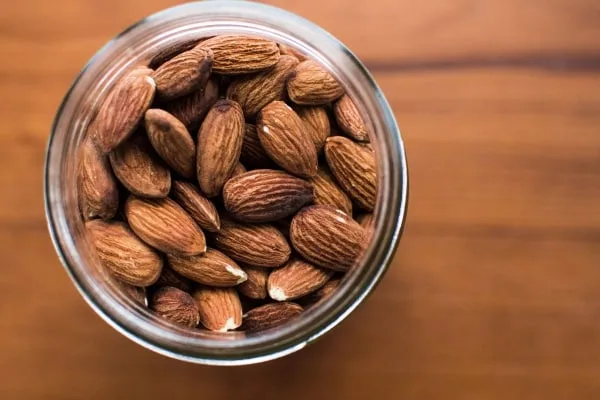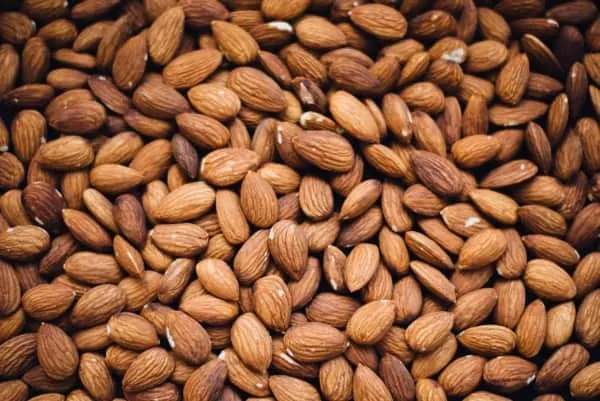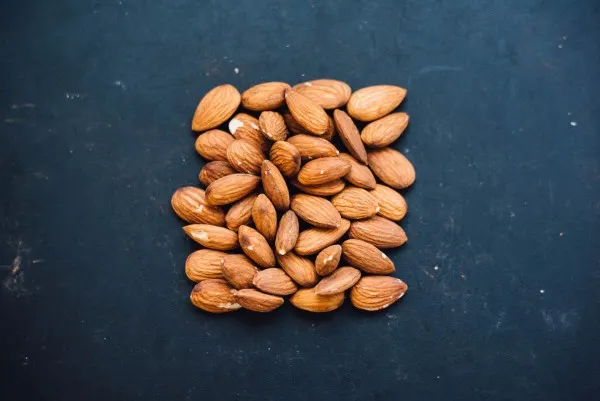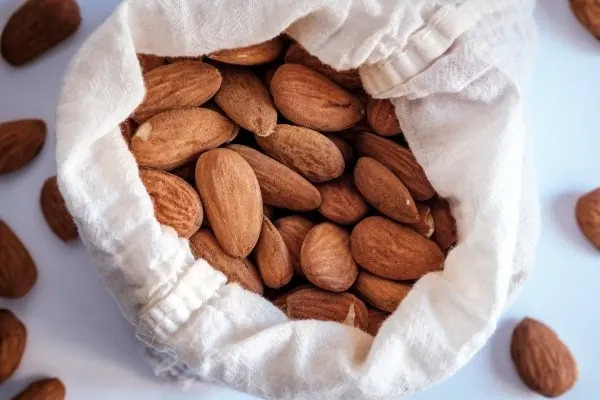Today we’re going to talk about the shelf life, storage, and spoilage of almonds.
Say you’ve just found an old, expired bag of almonds stashed away in the pantry. Unfortunately, it’s way past the printed date, and you’re wondering: do almonds go bad?
That’s when knowing how long almonds last or how to tell if almonds are bad comes in handy. And that’s what this article is all about.
Let’s dive in.
Table of Contents
- Do Almonds Go Bad?
- How to Tell if Almonds Are Bad?
- How Long Do Almonds Last?
- How to Store Almonds
- Can You Freeze Almonds?
- Almonds Shelf Life and Spoilage Summary

Do Almonds Go Bad?
Yes, almonds go bad when stored for too long or under suboptimal conditions.
The typical scenario is that those almonds will go rancid, meaning they will look and (often) smell fine but taste sharp and bitter. And while rancid nuts aren’t unsafe to eat, tossing rancid almonds for quality reasons is what I recommend.
I mean, nobody really likes to snack on bitter almonds. Plus, I wouldn’t risk adding them to any baked goods or salads and hoping that other flavors will overshadow the bitterness.
(Similarly, almond butter goes rancid too.)
That said, rancidity isn’t the only reason you might need to discard your almonds. Let’s talk about other possibilities.
How to Tell if Almonds Are Bad?
Toss your almonds if:
- The bag is infested. If you store your almonds in the pantry or kitchen cupboard and have insect issues, those bugs can get to your almonds too. If you notice any larvae, insect eggs, or dead bugs, toss everything.
- There’s mold in the bag. It’s highly unlikely, but if water got wherever you’re storing your almonds and mold started to grow, those nuts are done for.
- They’re rancid. Check if they taste sharp, bitter, rancid oil-like, or smell paint-like. If your almonds have a mild nutty aroma and taste okay, they’re fine.
Once again, rancidity is what’s most likely to happen, and you’ll learn about it only after digging into one of those almonds.
(Unless yours look discolored and completely dried out. If that’s the case, it’s almost certain they’ll be rancid too.)
To sum things up: if your almonds look and smell okay, eat one or two. If the taste is alright too, you’ve got perfectly edible nuts.
The good news is that almonds last quite some time (more on that in the next section), so unless you mistreat them in storage, they should be okay even for months past their date.

How Long Do Almonds Last?
Almonds retain best quality for about 6 months in the pantry or about 12 months in the fridge. Roasted almonds have a slightly shorter storage time.
If you need your almonds to stay good for longer, you can freeze them.
Truth be told, it’s difficult to say precisely how long almonds last, as the recommendations are a bit all over the place.
For instance, the United States Department of Agriculture says that you can store:
- in-shell almonds for 20 months at 0 °C (32 °F), 16 months at 10 °C (50 °F), and eight months at 20 °C (68 °F)
- shelled almonds keep for about half of that time
The FoodKeeper App, on the other hand, recommends the following:
- unshelled almonds keep for six months in the pantry, 16 months in the fridge, and 20 months frozen
- shelled almonds last four months in the pantry, eight months in the refrigerator, and ten months frozen
Then we have the University of California that suggest that almonds, both shelled and in-shell, keep for at least a year in the fridge.
Plus, if you’ve ever stored almonds at room temperature for more than a year, you know that they might still taste quite alright after that period. At least mine did.
In other words, the periods above are only very rough estimates. And you should always check the quality of your almonds instead of relying on dates.

Shelled vs. In-Shell
While you most likely buy almonds shelled, you might be wondering if there are any differences between shelled and unshelled almonds. There are.
The main one is that in-shell almonds last longer than shelled ones. Why is that the case, you ask?
It’s simple: the shell protects the kernel (the nut) from oxygen, humidity, and temperature fluctuations, all of which speed up rancidification.
That’s why you buy in-shell walnuts and in-shell peanuts if you need them to last as long as possible. I cover that in my article on the shelf life of peanuts and my piece called Do walnuts go bad?.
The downside is that you have to shell them yourself, so you have to choose what you value more: prolonged shelf life or convenience.
“Expiration” Date
Bagged almonds often have a best-by date (which isn’t an expiration date) printed on the label. However, that date is only an estimate, and you should treat it as such.
Having read the previous section, you already know that almonds often keep reasonably good quality for much longer than the printed date suggests.
Because of that, give almonds a quality check instead of checking the date and tossing them if they’re “expired.” And if there isn’t anything fishy going on (check the spoilage section for details) and the almonds aren’t rancid, feel free to use them.
To keep your almonds in the best shape for as long as possible, let’s talk about storage.

Using Lots of Almonds Quickly
If you’re looking for a way to use a lot of almonds quickly, I got two slightly unusual ideas for you to consider.
The first one is to make homemade almond milk. This milk alternative is quite popular nowadays, and making your own is a good alternative to buying another carton.
(If you want to use up your almonds, of course.)
When making this nut milk, remember that homemade almond milk lasts only a couple of days, so don’t go overboard.
The second option is to grind your almonds and make almond meal or almond flour. If you’re into baking, you’ll quickly find ways to use either in no time.
When going this route, remember that almond flour lasts several months. In other words, your almonds won’t magically last longer after you grind them.
How to Store Almonds
Store your almonds in an airtight container in the fridge or freezer if you want them to keep top quality for more than a year. If you place them in a bag or container in a cupboard at room temperature, they’ll last for at least half a year.
As you can tell, and as is the case with other nuts, the colder the storage spot, the longer your almonds will last.
So if you’ve ever stored almonds at warm temperatures for a couple of months and they’ve gone rancid, consider moving them to a colder spot, such as the fridge.
(Assuming that you can spare some refrigerator space, of course.)
If you’re interested why is that the case, it’s pretty simple. Cold storage minimizes lipid oxidation, meaning fat going rancid. That’s why it’s recommended to refrigerate many oils to extend their storage time.

Storing Almonds at Room Temperature
If you’re going with room temperature storage, choose a place that’s dry, dark, and away from any heat sources. A cabinet in the pantry or kitchen (away from the stove) should do the trick.
Now, if you’re like me, you probably store your almonds in a cupboard at room temperature. In such as setting, there are two good storage choices:
- A ventilated bag. Such a bag provides good airflow, which keeps the almonds nice and dry. The downside is that if you have an issue with pantry bugs, that bag won’t protect the nuts from insects.
- A resealable container or bag. Bags and containers are great because they protect the almonds from moisture and insects. That’s why I have a pile of freezer bags of various sizes that I use to store all sorts of foods.
Storing Almonds in the Fridge
When refrigerating almonds, go with an airtight container or freezer bag. Either reduces oxidation and keeps away any odors, which almonds readily absorb due to their high-fat content.
That bag or container is especially important when working with shelled almonds. Kernels of in-shell almonds will probably be alright even if you leave the nuts unprotected in the fridge for a couple of months.
Speaking of refrigeration, what about freezing almonds?
Can You Freeze Almonds?
Almonds freeze perfectly fine, and freezing is the recommended storage method if you want yours to last as long as possible.
The method is super simple: you place the almonds in a freezer bag, squeeze out the air, seal the bag, and freeze it. The whole procedure takes less than a minute.
Almonds don’t freeze together (unless they’re sliced), so there’s no need for pre-freezing.
When you need some almonds, you scoop them from the freezer bag and they’re ready to go. Just make sure to give them like half an hour on the counter if you want to snack on them. That should be enough to warm them up a bit.

Almonds Shelf Life and Spoilage Summary
I hope you found this guide helpful. Here are the main takeaways:
- Almonds eventually go bad. If you store them long enough, they’ll turn rancid.
- You can tell your almonds are rancid if they taste sharp or bitter, or give off a chemical or paint-like smell.
- The date printed on the bag isn’t an expiration date. It’s just a rough estimate of how long almonds keep good quality. And almost always, these keep way past that date. Instead of relying on dates, check the quality of your almonds instead.
- You can store almonds in a cupboard at room temperature for at least half a year or refrigerate them for at least a year. If your almonds are still in-shell, that period gets even longer.